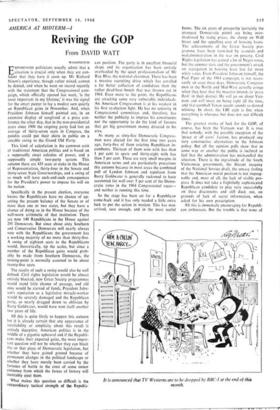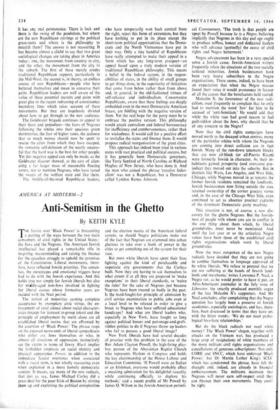Reviving the GOP
AMERICA AT MIDTERM-1
From DAVID WATT
WASHINGTON
EXPERIENCED politicians usually admit that a situation is crucial only when they are con- fident that they have it sewn up. Mr Richard Nixon's experience, though lather mixed, cannot be denied, and when he went on record recently with the statement that the Congressional cam- paign, which officially opened last week, 'is the most important in my lifetime,' it was the signal for the smart punter to lay a modest sum quietly on Republican gains in November. And, when President Johnson himself pointed out, in an extensive display of sangfroid at a press con- ference the other day, that in the non-presidential years since 1900 the reigning party had lost an average of thirty-seven seats in Congress, the pundits could put their shirts in public on a sizeable swing to the Grand Old Party.
This kind of calculation is the common coin of traditional American politics and is based on a supposedly exact calculus of power, and a supposedly simple two-party system. This autumn there are 435 seats at stake in the House of Representatives, thirty-four in the Senate and thirty-seven State Governorships, and a swing of so much will have such-and-such consequences for the President's power to impose his will on the nation.
Specifically in the present election, everyone knows the Republicans have no chance of up- setting the present balance of the Senate or of more than one or two states, but they have a chance of doing so in the House because of the well-worn arithmetic of that institution. There are now 140 Republicans in the House against 295 Democrats. But since about sixty Southern and Conservative Democrats will nearly always vote with the Republicans the government has a working majority of no more than thirty-five. A swing of eighteen seats to the Republicans would, theoretically, tip the scales, but since a number of the Republican gains would prob- ably be made from Southern Democrats, the turning-point is normally assumed to be about twenty-five seats.
The results of such a swing would also be well defined. Civil rights legislation would be almost entirely blocked, new Great Society programmes would stand little chance of passage, and old ones would be starved of funds, President John- son's reputation as a legislative miracle-worker would be severely damaged and the Republican party, so nearly dragged down to oblivion by Barry Goldwater, would have won itself another two years of life.
All this is quite likely .to happen this autumn but it is already certain that any appearance of inevitability or simplicity about this result is entirely deceptive. American politics is in the middle of a gigantic upheaval and if the Republi- cans make their expected gains, the most impor- tant question will not be whether they can block this or that piece of Democratic legislation, but whether they have gained ground because of permanent changes in the political landscape or whether they have merely been carried by the fortunes of battle to the crest of some minor eminence from which the forces of history will inevitably eject them.
What makes this question so difficult is the extraordinary tactical strength of the Repub4- can position. The party is in excellent financial shape and its organisation has been entirely overhauled by the quiet professionalism of Mr Ray Bliss, the national chairman. There has been a massive recruiting drive which has coralled a, far better collection of candidates than the rather dead-beat bunch that was thrown out in 1964. Even more to the point, the Republicans are attacking some very vulnerable individuals. An American Congressman is at his weakest in his first re-election fight. He has no seniority in Congressional committees and, therefore, has neither the publicity to impress his constituents nor the opportunity to do the kind of favours that get big government money directed to his area.
As many as sixty-five Democratic Congress- men were elected for the first time two years ago, forty-five of them evicting Republican in- cumbents. Thirteen of them won with less than 1 per cent to spare and thirty-eight with less than 5 per cent. These are very small margins in American terms and are particularly precarious this autumn because in most areas the combined pull of Lyndon Johnson and repulsion from Barry Goldwater is generally reckoned to have accounted for well over 5 per cent of the Demo- cratic votes in the 1964 Congressional races— and neither is running this time.
So the stage has been set for a Republican come-back and it has only needed a little extra luck to put the action in motion. This has now arrived, sure enough, and in the most useful forms. The six years of prosperity (certainly the strongest Democratic point) are being over- shadowed by rising prices, the slump on Wall Street and the appalling cost of housing loans. The achievements of the Great Society pro- gramme have been tarnished by scandals and maladministration in the war on poverty. Civil Rights legislation has gained a lot of Negro votes, but the summer riots and the government's attack on segregation in housing have lost far more white votes. Even President Johnson himself, the Pied Piper of the 1964 campaign, is not neces- sarily an asset these days. Democratic Congress- men in the North and Mid-West actually cringe when they hear that the maestro intends to 'press flesh' in their district. He will go on about Viet- nam and will insist on being right all the time, and that cornball Texan accent sounds so darned whining. In short, the LBJ style is fine when everything is whoopee but does not suit difficult times.
The greatest stroke of luck for the GOP, of course, has been the Vietnam war. It is true that nobody, with the possible exception of the `peace at all costs' faction, has produced any very constructive alternatives to the Johnson policy. But all the opinion polls show that in some way or another the public is inclined to feel that the administration has mishandled the situation. There is the ingratitude of the South Vietnamese government, the blatant inequity of the NatiOnal Service draft, the uneasy feeling that the American moral position is not impreg- nable and, most of all, the lack of visible pro- gress. It does not take a frightfully sophisticated Republican candidate to play very successfully on these discontents and still duck out, on grounds of lack of secret information, when asked for his own prescription. • All this is immensely encouraging for Republi- can enthusiasts. But the trouble is that none of
It is announced that TV Westerns are to be dropped by BBC-I at the end of this month. it has any real permanence. There is luck and there is the swing of the pendulum, but where are the new Republican stirrings at the political grass-roots and where is the philosophy to nourish them? The answer is not reassuring. It has become almost a cliché to say that two great sociological changes are taking place in America today : one, the movement from country to city, and the other, the movement from the city to the suburb. The first of these merely erodes traditional Republican support, particularly in the Mid-West; the second is, in theory, an endless source of new Republicans—people who have bettered themselves and mean to conserve their gains. Republican leaders are well aware of the value of these potential recruits and point with great glee to the recent redrawing of constituency boundary lines which takes account of these movements. But they are hopelessly divided about how to get through to the new audience.
The Goldwater brigade continues to appeal to their fears and prejudices—the fears of Negroes following the whites into their spacious green dormitories, the fear of higher taxes, the jealousy that so much money should now be spent to rescue the cities from which they have escaped, the romantic self-delusion of the nearly success- ful that the hard way is the best for other people. Yet this negative appeal can only be made, as the Goldwater disaster showed, at the cost of alien- ating a far larger mass of reasonable floating voters, not to mention Negroes, who have tasted the sweets of the welfare state and like them.
The middle-of-the-road Republican leaders, who have temporarily won back control from the right, reject this form of extremism, but they have nothing to put in its place except the short-term political opportunities that the Demo- crats and the North Vietnamese have put in their way. Only a tiny handful of Republicans have really attempted to make their appeal in a form which has any long-term prospect—an appeal based upon a truly modern version of traditional Republican philosophy. This means a belief in the federal system, in the respon- sibilities of states, in the ability of small groups to get things done, in the superiority of initiatives that come from below rather than from above and, in general, in the old-fashioned virtues of self-reliance and individualism. Conservative Republicans, aware that these feelings are deeply embedded even in the most Democratic American breast, are fiddling with the negative version of them. Yet the real hope for the party must be to embrace the positive version. This philosophy would attack centralism and federal bureaucracy for inefficiency and cumbersomeness, rather than for wickedness. It would call for a positive effort to revitalise the states and finance them. It would propose radical reorganisation of the great cities.
This approach has indeed been tried in various states with vast practical and political success, but it has generally been Democratic governors, like Terry Sanford of North Carolina or Richard Hughes of New Jersey, who have done it. And the man who coined the phrase 'creative feder- alism' was not a Republican, but a Democrat called Lyndon Baines Johnson.



































 Previous page
Previous page